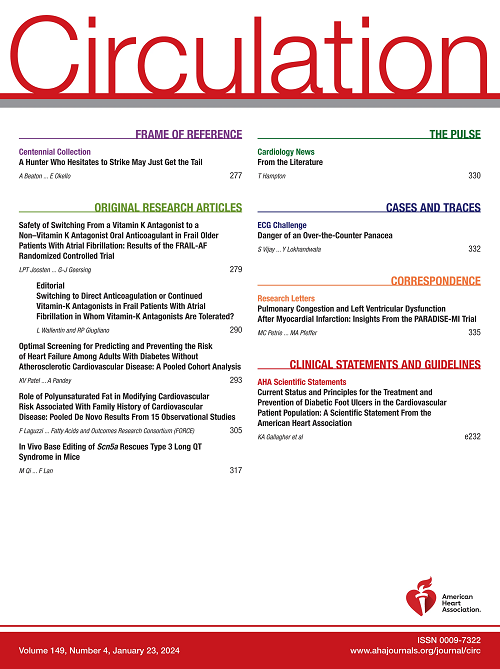Association of Smoking Cannabis With Cardiovascular Events Among Veterans With Coronary Artery Disease.
IF 35.5
1区 医学
Q1 CARDIAC & CARDIOVASCULAR SYSTEMS
引用次数: 0
Abstract
BACKGROUND Whether cannabis is a risk factor for cardiovascular events is unknown. We examined the association between smoking cannabis and cardiovascular events in a cohort of older veterans (66 to 68 years of age) with coronary artery disease. METHODS The THC Cohort (Heart and Cannabis) comprised 4285 veterans (mean [SD] age, 67.5 [1.01] years; 2% female) with coronary artery disease who were born in 1950 to 1952. Participants were recruited between April 5, 2018, and March 12, 2020, interviewed about health behaviors, and then classified according to their self-reported cannabis smoking status in the previous 30 days. In a separate analysis, we classified participants according to any form of cannabis use (smoking, vaping, or edible use) versus nonuse in the past 30 days. Data on demographic, behavioral, and clinical characteristics were collected by telephone interview and from national Department of Veterans Affairs and Medicare data sources. The primary outcome included a composite of fatal and nonfatal stroke, fatal and nonfatal acute myocardial infarction, and cardiovascular death. The follow-up period for each patient extended from the date of their initial interview until the end of study (June 14, 2022). All participants were followed until they experienced an outcome or until the end of the follow-up period. Survey nonresponse weights and propensity score-based weights were used to reduce bias and confounding. Hazard ratios were estimated using cause-specific hazard models. RESULTS The cohort included 1015 veterans with coronary artery disease who reported smoking cannabis in the previous 30 days and 3122 veterans who did not smoke cannabis in the previous 30 days. Mean follow-up was 3.3 years, and 563 events occurred. Compared with veterans who did not smoke cannabis, smoking cannabis (past 30 days) was not associated with the composite outcome of acute myocardial infarction, stroke, and cardiovascular death (adjusted hazard ratio, 0.87 [95% CI, 0.61-1.24]). Similarly, use of any form of cannabis (smoking, vaping, dabbing, edibles) in the past 30 days was not associated with the composite outcome. CONCLUSIONS In this cohort of older veterans with coronary artery disease, self-reported cannabis use was not independently associated with increased cardiovascular events over a mean of 3.3 years of follow-up.吸食大麻与冠心病退伍军人心血管事件的关系
背景:大麻是否是心血管事件的危险因素尚不清楚。我们在一组患有冠状动脉疾病的老年退伍军人(66至68岁)中研究了吸食大麻与心血管事件之间的关系。方法THC队列(心脏和大麻)包括4285名退伍军人(平均[SD]年龄67.5[1.01]岁;(2%为女性),出生于1950至1952年,患有冠状动脉疾病。参与者在2018年4月5日至2020年3月12日期间被招募,接受了有关健康行为的采访,然后根据他们在过去30天内自我报告的大麻吸烟状况进行分类。在另一项分析中,我们根据过去30天内使用大麻(吸烟、吸电子烟或食用大麻)与不使用大麻的情况对参与者进行了分类。人口统计、行为和临床特征的数据通过电话访谈和国家退伍军人事务部和医疗保险数据来源收集。主要结局包括致死性和非致死性卒中、致死性和非致死性急性心肌梗死以及心血管死亡。每位患者的随访期从首次访谈之日起延长至研究结束(2022年6月14日)。所有参与者都被跟踪,直到他们经历了一个结果或直到随访期结束。使用调查非反应权重和基于倾向得分的权重来减少偏差和混淆。使用特定原因风险模型估计风险比。结果该队列包括1015名报告在过去30天内吸食大麻的冠状动脉疾病退伍军人和3122名在过去30天内未吸食大麻的退伍军人。平均随访3.3年,共发生563起事件。与不吸食大麻的退伍军人相比,吸食大麻(过去30天)与急性心肌梗死、卒中和心血管死亡的综合结局无关(校正风险比为0.87 [95% CI, 0.61-1.24])。同样,在过去30天内使用任何形式的大麻(吸烟、吸电子烟、吸大麻、食用大麻)与综合结果无关。结论:在这个患有冠状动脉疾病的老年退伍军人队列中,在平均3.3年的随访中,自我报告的大麻使用与心血管事件的增加没有独立的相关性。
本文章由计算机程序翻译,如有差异,请以英文原文为准。
求助全文
约1分钟内获得全文
求助全文
来源期刊

Circulation
医学-外周血管病
CiteScore
45.70
自引率
2.10%
发文量
1473
审稿时长
2 months
期刊介绍:
Circulation is a platform that publishes a diverse range of content related to cardiovascular health and disease. This includes original research manuscripts, review articles, and other contributions spanning observational studies, clinical trials, epidemiology, health services, outcomes studies, and advancements in basic and translational research. The journal serves as a vital resource for professionals and researchers in the field of cardiovascular health, providing a comprehensive platform for disseminating knowledge and fostering advancements in the understanding and management of cardiovascular issues.
 求助内容:
求助内容: 应助结果提醒方式:
应助结果提醒方式:


